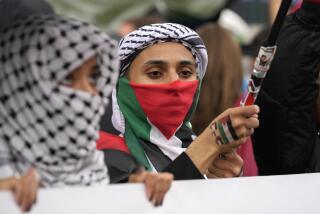Egypt rallies mark crackdown’s anniversary; 3 killed, scores arrested
- Share via
Reporting from Cairo — For many Egyptians, Thursday marked the start of a searing anniversary.
At least three people were killed and more than 100 arrested in confrontations between protesters and Egyptian security forces on the first anniversary of the bloody dispersal of sit-in protests in Cairo that had left hundreds dead.
Thursday’s deaths occurred in Giza, across the Nile from Cairo proper, and in the capital itself as hundreds of supporters of ousted Islamist President Mohamed Morsi took to the streets. The demonstrations -- far smaller than Islamists were able to marshal a year ago -- came in response to calls by a group affiliated with the Muslim Brotherhood to commemorate the August 2013 deaths.
Egypt’s government says at least 600 people, including 42 police, were killed during the confrontation at Rabaa al-Adawiya Square and elsewhere in Cairo. Rights groups -- including the New York-based Human Rights Watch -- say at least 800 died, and perhaps more than 1,100.
On Thursday morning, scores of Brotherhood supporters attempted to block traffic in Cairo and Giza by setting car tires ablaze on main roads while security forces intensified their presence to counter planned marches.
In Cairo, iconic venues such as Tahrir Square and Rabaa al-Adawiya -- together with roads leading to the presidential palace -- were closed by the police earlier in the day to prevent unrest. Army and police checkpoints were erected to check vehicles entering the capital.
Police on Thursday dispersed marches in the Mediterranean city of Alexandria, where the Brotherhood is strong, and other locales. Protesters chanted slogans against President Abdel Fattah Sisi and displayed the four-fingered hand signs that signify Rabaa. In the governorate of Minya, about 90 miles south of Cairo, protesters managed to block rail traffic for a few hours.
Morsi supporters have been struggling to gather momentum over the last year, amid a wide-ranging crackdown. Most Egyptians were content to see the end of his rule, amid fears that he was in a process of imposing a strict form of Islam on the country and excluding non-Brotherhood loyalists from participating in government.
Islamists have claimed responsibility for various attacks targeting security personnel throughout Egypt since last year’s violence. According to figures issued by the Interior Ministry, at least 500 security officers have died in bombings and assaults by Islamist groups over the last 12 months.
Last year’s sit-ins in support of Morsi, at Rabaa and elsewhere, were organized by the Muslim Brotherhood and its Islamist supporters, beginning before massive nationwide protests against Morsi’s rule at the end of June 2013. The sit-ins were continued after the army-led dismissal of Morsi until a temporary Cabinet ordered the protesters dispersed at any cost.
Egypt is still divided over events that took place beginning on Aug. 14 of last year. Many condemn security forces for deploying excessive force against protesters; others believe that the presence of weapons among Brotherhood members justified the crackdown.
An Egyptian fact-finding committee was formed to investigate the events at Rabaa and its aftermath. But no results have been formally released, and no one has been held responsible for the deaths.
Hassan is a special correspondent.
More to Read
Sign up for Essential California
The most important California stories and recommendations in your inbox every morning.
You may occasionally receive promotional content from the Los Angeles Times.












